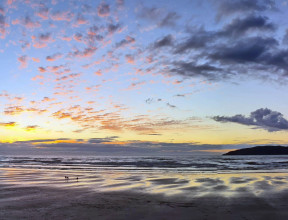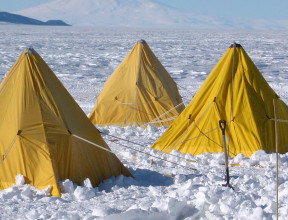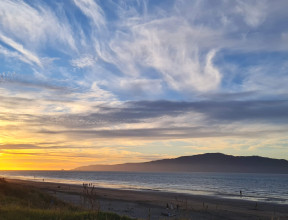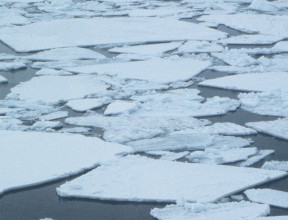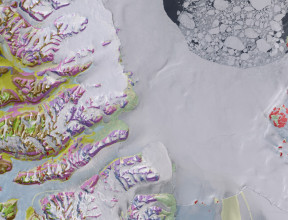
Antarctica
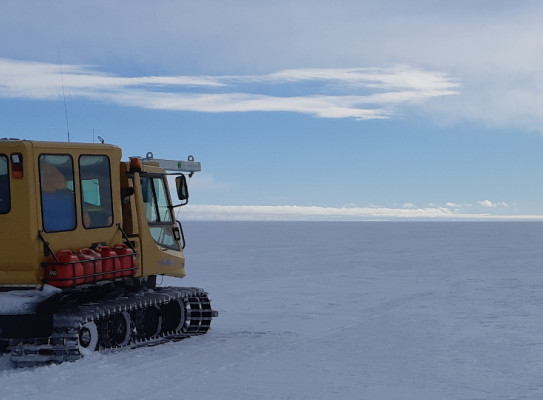
Antarctica, a key regulator of global systems, is being impacted by climate change. Our researchers strive to understand the role Antarctica will play in a warming world.
Antarctica’s unique role
Antarctica and its ice, ocean and ecosystems play a critical role in regulating global climate. They contribute to slowing global heating, driving important ocean currents and drawing down millions of tons of carbon dioxide from the atmosphere.
A make a difference moment – The amount of sea level rise in our future would be devastating for our coastal communities. We have to avoid it. transcript
We know from our studies of Antarctica's past that when greenhouse gas levels are high temperatures are high, and the ice sheet melts sea level goes up. We know that a warming of two degrees can cause the ice sheet to melt such that sea level goes up by 20 meters.
This amount of sea level rise in our future would be devastating for our coastal communities. We have to avoid it.
Cot 26, to me it offers a real opportunity for us all it's hope. My kids were lamenting the fact that the climate system is going to change and it's going to be not a very bright future for them and it's horrible right and it's a massive burden to bear. And so I've realised that we need to promote this sense of hope, and the fact that we can make a difference and cop 26 is one of those key make a difference moments for humanity.
Here we have the international powers coming together to make what is arguably one of the most important decisions in all of human history.
What will our future be? Will it be one that is warm to the point that the ice sheets melt sea level goes up by one, two, three, four, five meters and our coastal communities have to adapt to a large amount of change that will be disruptive and disastrous.
Or do our leaders say right we'll get these emissions under control and keep warming to a minimum such that Antarctica doesn't melt as much, and the effect of that change in Antarctica is much smaller and manageable. So what we've learned from our studies in Antarctica, is that there is there is room to move, we've still got time. We haven't quite crossed the threshold where Antarctic ice sheet melt becomes unstoppable.
The window is small we don't have a lot of time we've got to act now, but we do have the chance to avoid that large damaging and catastrophic change in Antarctica that will affect the world.
A make a difference moment
The amount of sea level rise in our future would be devastating for our coastal communities. We have to avoid it.
The climate crisis is disrupting Antarctica’s delicate systems. The composition of the water around Antarctica is changing, becoming warmer, fresher and less dense, which may lead to disruptive changes in global ocean circulation.
The Antarctic Ice Sheet, which accounts for 62% of Earth’s freshwater, is in decline, a process which is contributing to global sea level rise. Changes to Antarctica may have serious implications for life on earth.
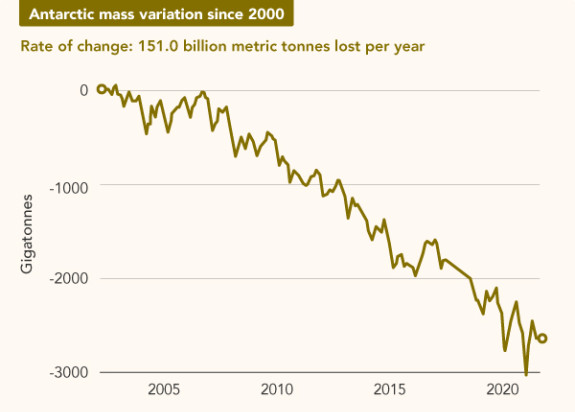
A global effort to understand
GNS Science is part of a global effort to understand how climate change is impacting Antarctica and how changes to Antarctica will impacts global systems. We also look for clues in Antarctica’s ice sheets about what past conditions were like during warmer periods of Earth’s history.
This knowledge will help scientists predict what might happen in the future if global temperatures continue on their current trajectory towards 2.7°C above pre-industrial levels. Predictions will allow us to better prepare for the future.
The past is the key to our future | Dr. Katelyn Johnson – Dr. Katelyn Johnson on time capsules frozen in Antarctic ice transcript
Paleoclimate science is vitally important to our understanding of the whole climate system, because the past is the key to our future.
I'm Katelyn Johnson, I'm a Paleoclimate scientist at GNS science. What that means is I study how climate has changed in the past. In order to do this I utilize a record called an ice core.
Me and my team travel all the way down to Antarctica and spend several months down there drilling these long cylinders of ice from the ice sheet.
This ice forms as snow falls from year to year and that forms layers in the ice, and if you can imagine this long cylinder of ice is kind of like a book where each layer is a different page.
Each page contains vast amount of information about the climate but one of the most important ones are the little tiny air bubbles that are trapped that form tiny time capsules capturing the atmosphere at a given time.
When we talk about changing greenhouse gas concentrations the way we are able to understand that our current greenhouse gas concentrations are so much higher than they've ever been, is by analyzing these tiny bubbles.
Paleoclimate records are important for a variety of reasons we need as much information we can about the past in order to understand how the climate has changed naturally without human influence. That involves taking paleoclimate records such as corals, stalactites, stalagmites sediment cores, ice core records from all over the world.
If you can imagine we really only have observational records since about the 1850s, and we only have satellite records from about the 1970s. So if we want to understand how climate has changed over hundreds of thousands to millions of years, these paleoclimate records are vitally important.
Paleoclimate scientists will continue to go all over the world to these remote locations gathering these records in order to help us understand the challenges we're facing.
The past is the key to our future | Dr. Katelyn Johnson
Paleoclimate science is vitally important to our understanding of the whole climate system.

